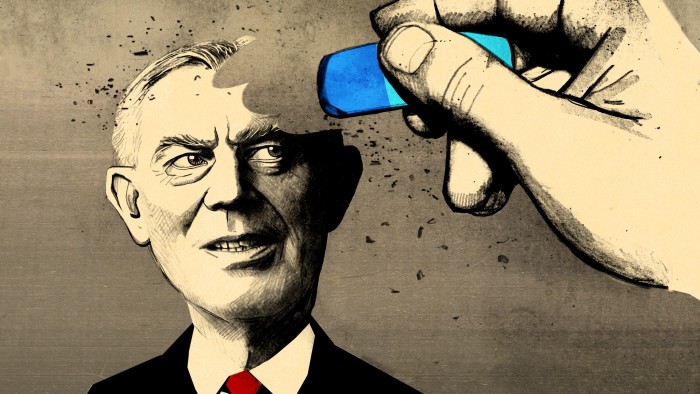Share this @internewscast.com
Unlock the Editor’s Digest for free
A former Conservative MP recounts an encounter where Margaret Thatcher was queried on her most significant political accomplishment. Her response was “Tony Blair and New Labour.” She believed they were compelled to adopt her views. Although she may have listed various achievements throughout the years, this statement resonated strongly with her perspective that politics was a battleground for ideologies.
Fast forward 50 years after Thatcher’s ascent to Tory leadership, and her followers have a new outlook. Blairism is viewed not as her crowning success but as a deviation for the nation. Today, unraveling that period is a key focus for current Conservative leaders and Nigel Farage’s Reform UK party.
For a long time, Blair’s government was perceived not as radically altering the status quo but as reinforcing and adapting the Thatcher-era principles through enhancements in public services and policy goals, like lowering child poverty and increasing workforce participation among women.
In contrast, the modern right has reevaluated its stance. Blairism is now seen as shaping politics across two decades, with Tory leaders such as David Cameron, Theresa May, and to some extent Boris Johnson, adopting much of Blair’s social policies. The emerging right wing, including Reform UK, argues that the New Labour period weakened executive power, expanded welfare programs, and introduced regulations and social protections that hinder innovation, while fostering what they term as “woke” culture.
Although Brexit and migration debates might have overshadowed the extent of the right’s objectives, this year’s party gatherings have clarified what was previously fragmented. Ending the pro-European era was just the start, intended not only as a goal but as a means to dismantle the foundational structures of Blair’s Britain.
The legislative measures both parties aim to repeal or revise encompass several New Labour policies, such as the Climate Change Act and the inclusion of the European Convention on Human Rights into UK law. The list also includes the Constitutional Reform Act that established the Supreme Court and transferred judge-appointing powers from the Lord Chancellor to an independent body, as well as the Equality Act and hate crime legislation. Reform UK has indicated intentions to assess the Bank of England’s independence, evoking Donald Trump’s criticisms of the Federal Reserve and broader populist skepticism towards autonomous regulators. Even Scottish and Welsh devolution are up for review.
The Blair dream of 50 per cent of students going into higher education is now seen as a mistake, as is the creed of multiculturalism, the belief in multinational institutions and globalisation generally. And, of course, Blair is also blamed for the wave of immigration from eastern Europe. Tories and Reform view New Labour’s welfare policies as the catalyst for the current high levels of in-work benefit payments.
The rising salience of religious Christianity and natalism in parts of both parties has left some women fearful of a more traditionalist approach to their rights. Nigel Farage has already backed stricter abortion rules, calling the UK’s 24-week limit “totally out of date”.
In many areas there is a legitimate critique here. Even Prime Minister Sir Keir Starmer accepts the UK is over-regulated, with unaccountable officials and quangos creating a democratic deficit. There is an issue with judicial activism. Welfare bills are too high. But the right’s agenda also reflects a broader desire to pare back the state’s social missions.
The new right wishes to return to the original Thatcher settlement (perhaps forgetting her early support for climate action or the single market). They argue that the Conservatives’ biggest mistake was their admiration for Blair and willingness of Cameron and others to sign up to what they saw as his liberal agenda.
There are risks in this for Conservatives who need to rebuild their coalition and who, wisely, are now focused on restoring their economic credibility. There is no path back unless they can regain the southern seats lost to the Liberal Democrats. Many of those former Tory voters quite liked the Blair era.
Blair’s social democracy offered a vision of a market economy in which growth could be tailored to global challenges and social justice, a middle route between the harshest version of the free market and socialist interventionism. There is a case that it has ceased to deliver in a low-growth economy, but without it the only alternative to the new right will be left populism.
The politics of the right is now a battle to be seen as the primary alternative to Labour. Reform clearly has the upper hand but to retain it the party must destroy the Tories as a viable option. Even a modest Conservative revival will rapidly shift calculations. But whoever prevails, this is the right’s new agenda.
There are counter-arguments to the critique of the Blair settlement. Not all regulation is bad. For all the legitimate questions about judicial activism and over-reach, do we really want to return to judges appointed by cabinet ministers? It might feel good when you are in power; in opposition not so much.
But both parties have sniffed the electoral winds and sense a country seeking a shift of direction. Even Labour is revisiting the Blair agenda, be it on university numbers or immigration policies.
Politics is a never-ending battle of ideas and the fight to deconstruct the Blair settlement is gathering momentum. Things can only get bitter.
robert.shrimsley@ft.com







